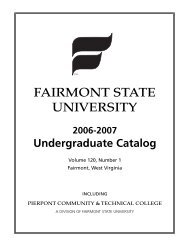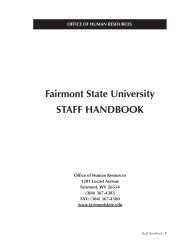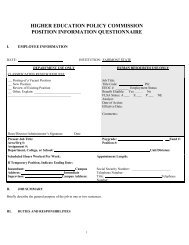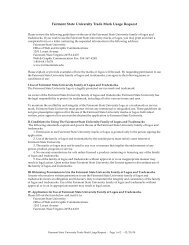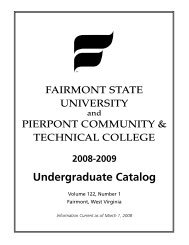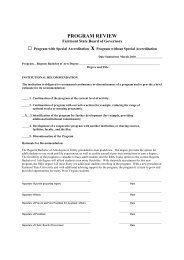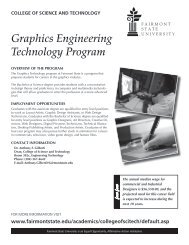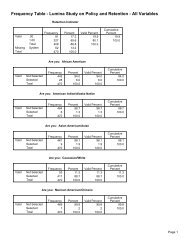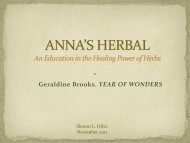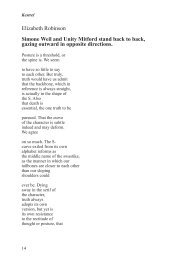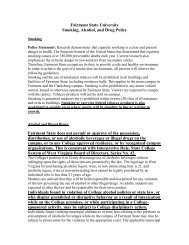Faculty Handbook - Fairmont State University
Faculty Handbook - Fairmont State University
Faculty Handbook - Fairmont State University
Create successful ePaper yourself
Turn your PDF publications into a flip-book with our unique Google optimized e-Paper software.
141<br />
by this examination include site planning, design, structures,<br />
mechanical/electrical/plumbing systems, professional practices, and pre-design.<br />
2. Experience Requirement – The experience requirement may be fulfilled by working in<br />
any capacity as a licensed architect.<br />
AVIATION FACULTY:<br />
1. Appropriate National Certification -- Successful completion of the examination for the<br />
Federal Aviation Administration’s Aircraft Maintenance License with the<br />
Airframe and Power plant (A&P) ratings.<br />
This five part examination consists of written, oral, and practical skills in each of fortytwo<br />
technical areas. Topics covered include engineering fundamentals, aviation<br />
science/technology, quality assurance, and safety.<br />
2. Experience Requirement -- The experience requirement may be fulfilled by working as<br />
an FAA licensed Aviation Maintenance Technician.<br />
ENGINEERING TECHNOLOGY FACULTY (Except Safety Engineering Technology):<br />
1. Appropriate National Certification -- Successful completion of the Professional<br />
Engineering certification (P.E.)<br />
Prior to taking the P.E. examination, a passing grade must be achieved on an eight-hour<br />
Engineering Fundamentals examination which covers topics generic to a variety of<br />
engineering related disciplines. An eight-hour Principles and Practices of Engineering<br />
(P.E.) examination must be passed for professional certification. This examination<br />
focuses on specialized engineering disciplines such as Civil, Electrical, Manufacturing,<br />
Mechanical, etc.<br />
2. Experience Requirement -- The experience requirement may be fulfilled by working as<br />
a licensed Professional Engineer (P.E.).<br />
SAFETY ENGINEERING TECHNOLOGY FACULTY:<br />
1. Appropriate National Certifications -- Successful completion of the Certified Safety<br />
Professional (C.S.P.) or Certified Industrial Hygienist (C.I.H.) examinations.<br />
Prior to taking either the C.S.P or C.I.H. examination, a passing grade must be achieved<br />
on an eight- hour Core Examination for each specialization. <strong>Faculty</strong> working toward the<br />
Certified Safety Professional Exam would take the Associate Safety Professional (A.S.P.)<br />
Core Examination and faculty working toward the Certified Industrial Hygienist<br />
Examination would take the Industrial Hygienist in Training (I.H.I.T.) Core Examination.<br />
An eight-hour Certified Safety Professional (C.S.P.) or Certified Industrial Hygienist<br />
(C.I.H.) examination must be passed for professional certification. These examinations<br />
focus on comprehensive practices and management principles within these two<br />
specialized fields of study.<br />
2. Experience Requirement -- The experience requirement may be fulfilled by working as<br />
a Certified Safety Professional (C.S.P.) or a Certified Industrial Hygienist (C.I.H.).



